Interviews with presenters and exhibitors from the 6th annual innovation showcase event, Merged Futures 6 in the UON Learning Hub on Friday 14th June 2024 by Learning Technologist Richard Byles.
In this short film, Dr Mu Mu, Programme Leader for the AI and Data Science course, and students discuss a new project that aims to improve student access to information through the development of a new AI chatbot.
Dr Mu Mu explains that students often have common questions about their schedules, deadlines, and accommodation. To address these needs, second-year students are tasked with creating an AI chatbot. Three BSc Artificial Intelligence & Data Science students share insights into the development process.
Dr Mu Mu emphasises the broader learning outcomes: “It’s not only about the technical challenges, but also thinking about ethics, legal issues, and how to make the chatbot more personalised.”
The practical experience gained from this project has led the students gaining successful placements and internships in prestigious UK organisations. This project exemplifies how our programme not only equips students with technical expertise but also prepares them to navigate and address real-world challenges.
The following report provides an overview of the findings of the Generative AI Staff Survey which was available to all staff at UON from the 12th of Feb to 12th of April 2024.
The purpose of the survey is to explore staff understanding and use of Generative Artificial Intelligence tools, and their impact on staff roles at UON.
Author: R Howe. Researchers: K Lea, R Byles.
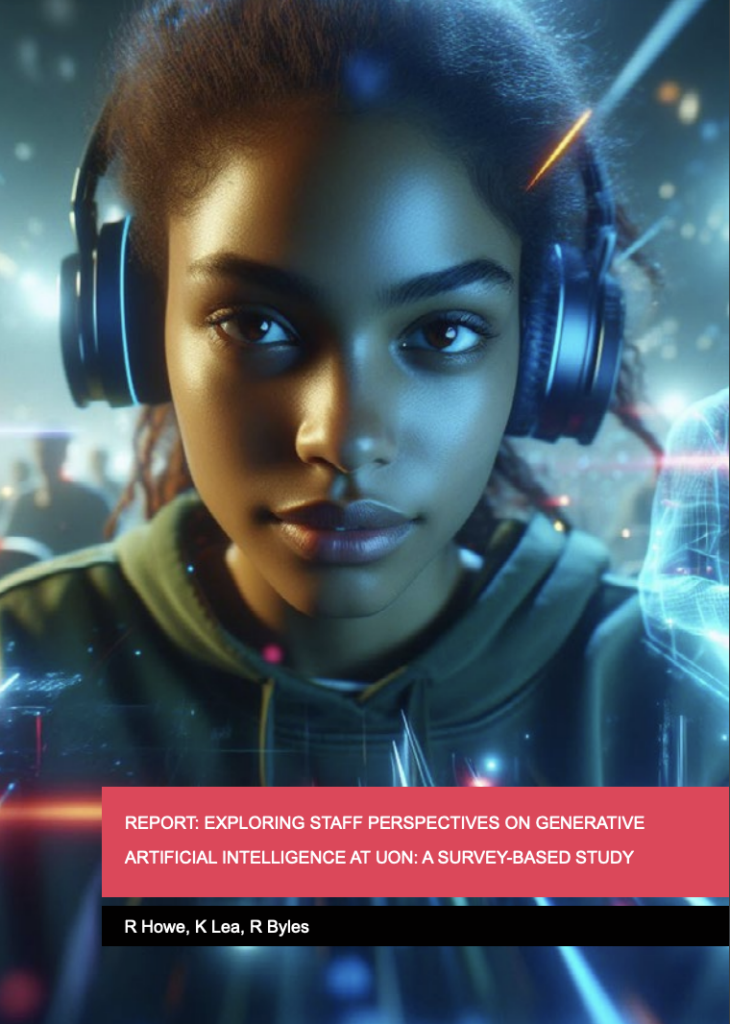
Catch up with the latest news, case studies, and other interesting stories from the Learning Technology Team.
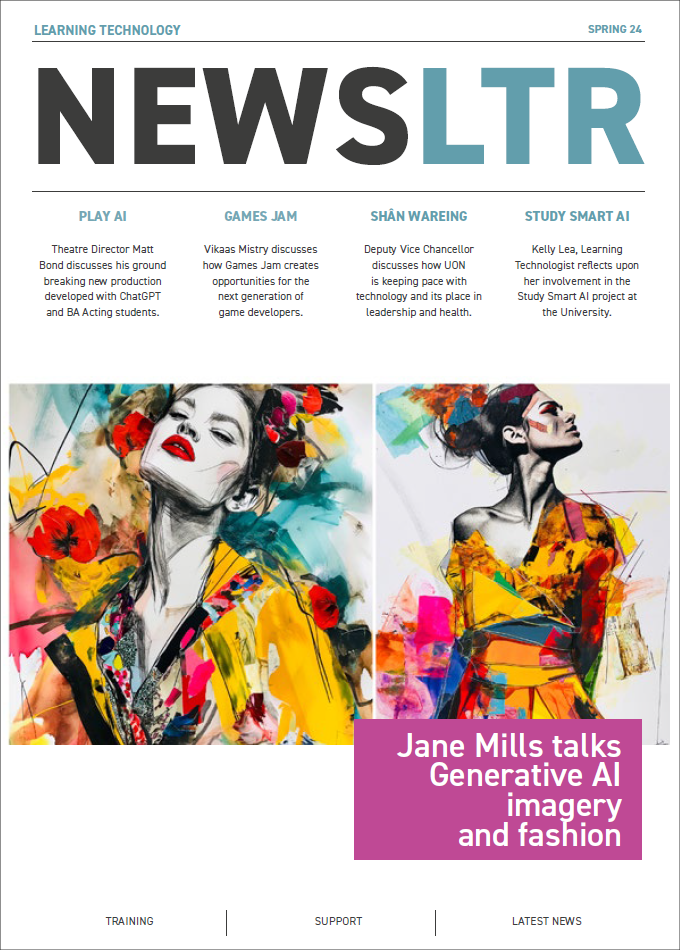
Download the Learning Technology Team Newsletter – Semester 2, 2023/24 (PDF, 560 KB)
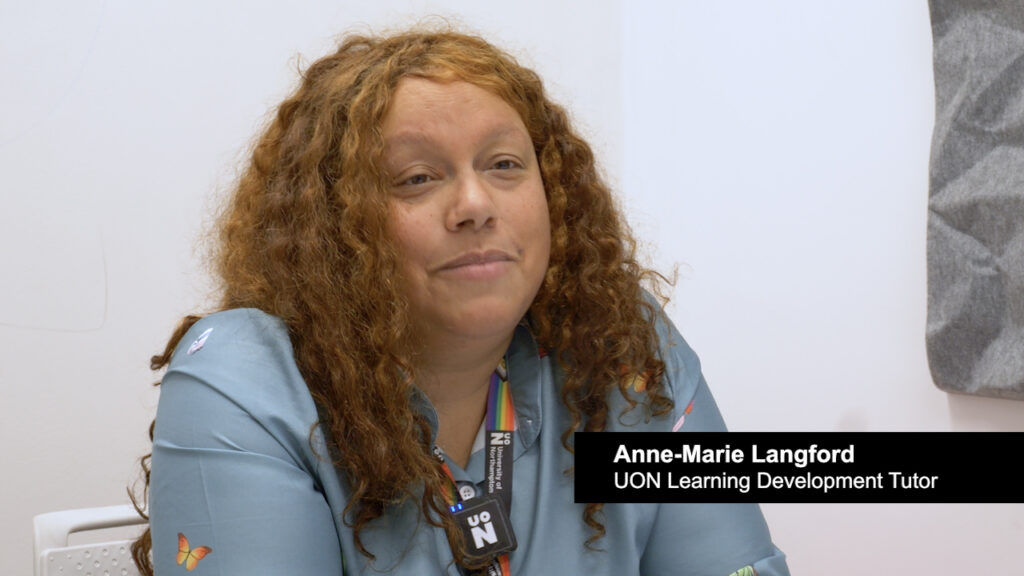
In this short video UON Learning Development tutor Anne-Marie Langford discusses her work employing generative AI to produce sample passages of academic writing for analysis and refinement in development workshops.
Anne-Marie notes that the use of AI-generated text can prompt students to critique academic writing, encouraging them to develop higher order thinking skills. This proves particularly valuable in scrutinising shortcomings in generative AI-generated text which can prove useful in identifying and presenting knowledge but are less adept and applying, analysing and evaluating it.
While recognising the time-saving potential of chatbots such as ChatGPT and their uses in enhancing student learning, she underscores the limitations of GAI in academic writing and referencing. Anne-Marie emphasises the importance of students adopting a critical, ethical and well-informed approach to using generative AI, urging them to cultivate their own critical voices and refine their skills.
By incorporating text from generative tools into her sessions, Anne-Marie exemplifies the advantages of modelling critical use of generative AI with students.
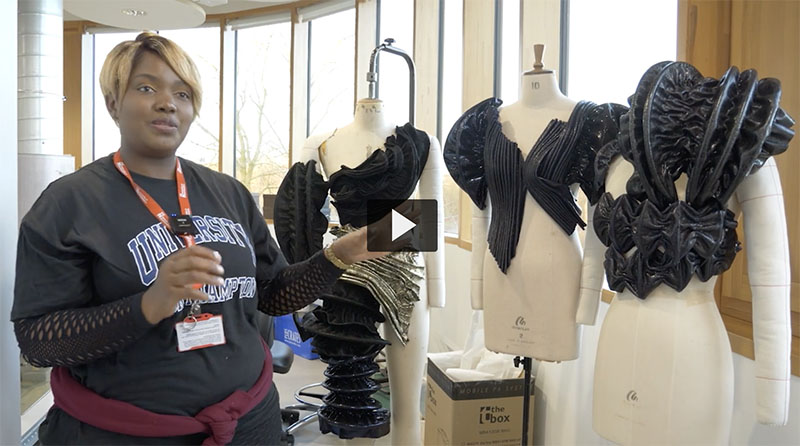
This short film features three BA Fashion, Textiles, Footwear & Accessories students discussing their experiences using Generative AI (GAI) in their projects. The students demonstrate diverse applications of GAI, highlighting how they tailor the technology to their individual creative needs.
The film features Subject Head Jane Mills, who discusses the potential of AI to support students, and outlines the introduction of a new AI logbook – designed to provide a framework for students to confidently explore and utilize GAI for brainstorming and research purposes.
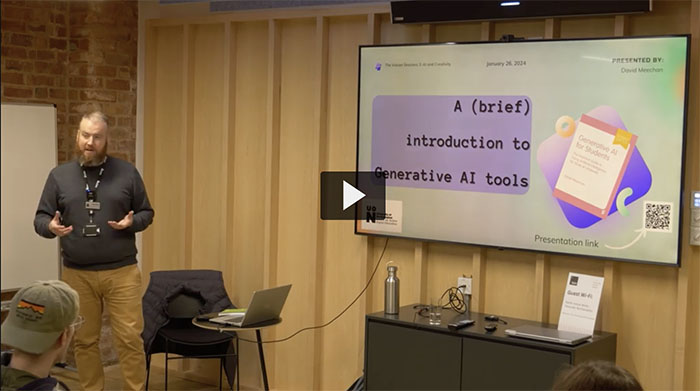
In this condensed talk from the Vulcan Sessions on 26/01/24, Senior Lecturer in Education David Meechan discusses the opportunities and considerations of using AI in education.
Introducing the concept of Generative Artificial Intelligence (GAI) as a diverse and constantly evolving field without a consistent definition among scholars. He shares personal examples of how GAI can help support students by scaffolding their learning and reducing the initial cognitive load through the creation of basic first drafts.
David expresses, ‘I’m a big believer in experiential learning, providing children, and now students, with experiences they can build on.’ Therefore, he advocates for the use of GenAI tools, which offer ‘varied, specific, and potentially creative results, revolutionising education and supporting lifelong learning.’
Emphasising the importance of the ethical use AI tools in education, he argues for engagement with a wide range of GenAI tools to prepare students for navigating future changes in the education and technological landscape.
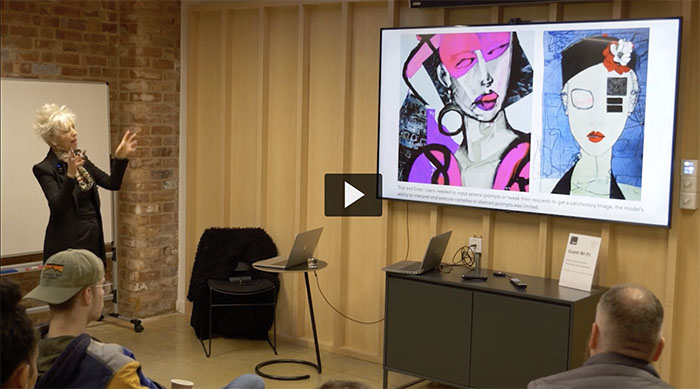
In this short film Jane Mills delves into the realm of text-to-image Generative AI models, experimenting with platforms such as Stable Diffusion and Midjourney. Initially encountering what she described as “odd and distorted” images, she highlights the evolving landscape of Generative AI images during this period.
“In 2023 the images started to look better,” Jane explains, noting a significant breakthrough as these AI models began capturing intricate details, showcasing her expertise as a fashion specialist, particularly in facial features, colour pallets, fabric textures and embellishments.
By May 2023, AI integration became a reality in the discipline of Fashion teaching. Jane champions the fusion of human creativity with machine efficiency, enabling designers to conceptualise runway shots, intricate patterns, and expressive collages.
Highlighting the importance of designing detailed prompts, Jane illustrates how specifying techniques, mediums, and styles could lead to incredible results, ranging from watercolor cityscapes to photorealistic textures.
Generative AI serves as a powerful tool that provides fresh perspectives, preparing students for the ever-evolving fashion industry. This approach facilitates faster design processes, hones skills, and meets industry demands.
“It’s an assistive tool, a collaborator that empowers human imagination. As students gain valuable experience using this transformative technology, they’re not just designing the future of fashion; they’re shaping the way we think about its creation,” she emphasised.
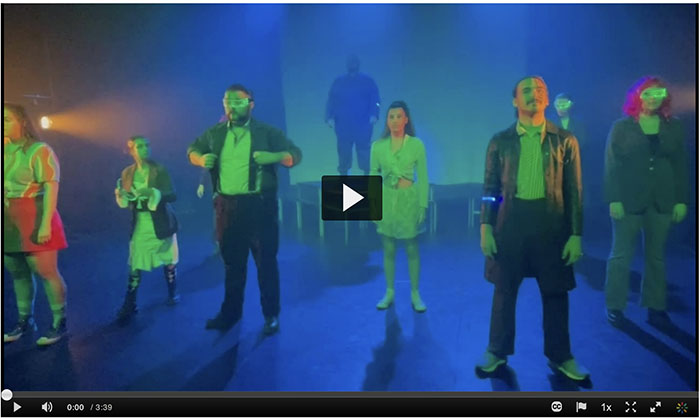
In this short film, Theatre Director Matt Bond delves into the intricacies of his pioneering theater experiment, “PlayAI,” a collaborative venture with the AI tool ChatGPT.
Building on the success of his groundbreaking work at Riverside Studios in London in April 2023, this project challenges the traditional boundaries of playwriting by immersing itself in the realms of exploration and experimentation with Artificial Intelligence.
Over a transformative four-week period, Bond collaboratively engaged with UON BA Acting students to craft a new play that delves into profound themes. These themes encompass the nuanced emotions surrounding redundancy and belonging in the age of Artificial Intelligence, the complexities of forging relationships with digital avatars, and the conflicting dynamics between idealism and capitalism within a futuristic digital ‘metaverse’ society.
The film provides valuable insights as four BA acting students share their perspectives on how they have embraced AI technology as a powerful catalyst for innovation and exploration.
Moreover, the impact of the project transcends the realm of performance. It becomes evident that the students, in their exploration of key AI concepts, have not only expanded their digital literacies but have also delved into the ethical boundaries of AI. Their involvement reflects a meticulous and comprehensive approach to working with AI, showcasing a profound commitment to understanding and navigating the intricate facets of this transformative technology.
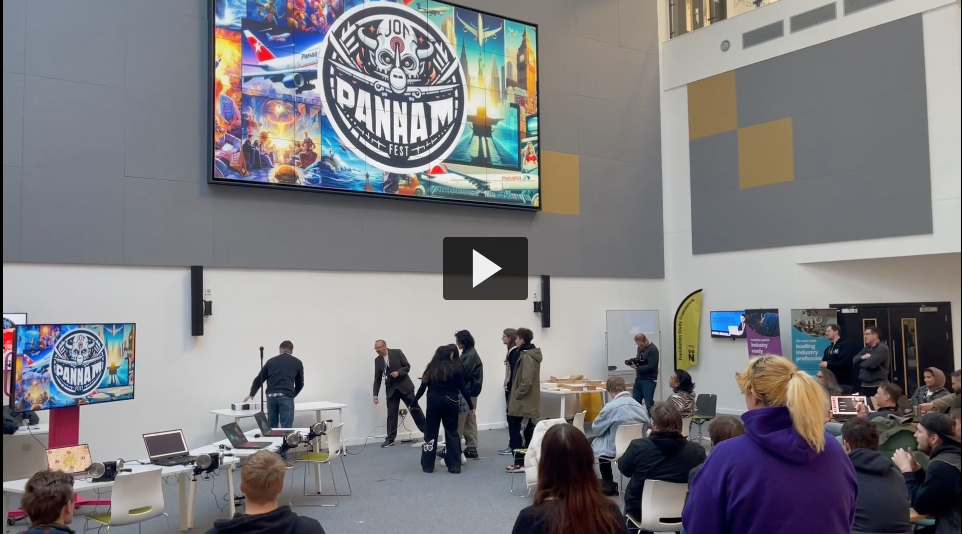
This January, UON hosted the Winter Game Jam, a four-day games development event where students battled it out with a brand new challenge: the Rexy Wheel, a digital controller designed for training video camera professionals.
In this short film, Games lecturer Vikaas Mistry discusses how Game Jam is about giving UON students experiences that will prepare them for new developments in the game industry, and to think outside of the box.
Rob Portus, the Rexy Wheel’s inventor, shares how it was really exciting to see what they’ve done ‘in just four days, they all created games that with a few tweaks have the potential to be marketed commercially.’
Recent Posts
- Blackboard Upgrade – March 2026
- Blackboard Upgrade – February 2026
- Blackboard Upgrade – January 2026
- Spotlight on Excellence: Bringing AI Conversations into Management Learning
- Blackboard Upgrade – December 2025
- Preparing for your Physiotherapy Apprenticeship Programme (PREP-PAP) by Fiona Barrett and Anna Smith
- Blackboard Upgrade – November 2025
- Fix Your Content Day 2025
- Blackboard Upgrade – October 2025
- Blackboard Upgrade – September 2025
Tags
ABL Practitioner Stories Academic Skills Accessibility Active Blended Learning (ABL) ADE AI Artificial Intelligence Assessment Design Assessment Tools Blackboard Blackboard Learn Blackboard Upgrade Blended Learning Blogs CAIeRO Collaborate Collaboration Distance Learning Feedback FHES Flipped Learning iNorthampton iPad Kaltura Learner Experience MALT Mobile Newsletter NILE NILE Ultra Outside the box Panopto Presentations Quality Reflection SHED Submitting and Grading Electronically (SaGE) Turnitin Ultra Ultra Upgrade Update Updates Video Waterside XerteArchives
Site Admin

